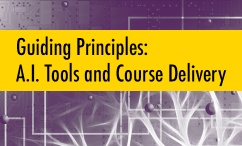A.I. and Academic Integrity
The growing popularity of A.I. has brought with it increased attention and conversation around academic integrity in higher education. However, violations of academic integrity happened before ChatGPT, whether students copied from each other, bought a paper or assignment (aka, “contract cheating”), or copied verbatim from the Internet without attribution. The introduction of ChatGPT and other newer A.I. tools bring with it opportunities to initiate conversations with students and bolster classroom messaging around academic integrity, as well as redesign assessments that are authentic, aligned with course learning outcomes, and emphasize process over product. Know, too, that software claiming to detect A.I.-generated writing is not reliable and produces false positives. It is very important to provide a thorough explanation and rationale, within your syllabus, outlining acceptable (or unacceptable) use of A.I., should you want to prohibit A.I. use
As A.I. continues to proliferate (ChatGPT was not the genesis of A.I.-powered software), the line between “original” and “plagiarized” gets fuzzier; and, considering ChatGPT is not a person, simplistic definitions of plagiarism (i.e., “copying other’s words”) do not capture the complexity of using A.I.-powered tools. Sarah Elaine Eaton offers a “postplagiarism” paradigm that recognizes the hybridity of human writing and the possibility for the enhancement of human creativity (Eaton, 2021, 2023). Though her postplagiarism tenets may lean too heavily toward technological optimism, they suggest a tempered and open orientation toward A.I. tools, to allow everyone to find their footing in an ever-shifting landscape.
Detecting A.I. in Students’ Work
As quickly as LLMs like ChatGPT gained popularity, so did A.I. tools that claim to be able to detect A.I. writing. As an A.I. tool itself, the detectors are subject to the accuracy issues inherent in all A.I. technologies. Detection tools often produce false positives, such as misidentifying non-native English writing as A.I.-generated (Liang et al., 2023). False negatives are also prevalent as it is relatively easy to prompt A.I. in ways that produce writing that can bypass detection. At this time, Nova Scotia privacy law and Dalhousie’s Protection of Personal Information Policy do not allow you to submit or upload students’ work to any tool, whether driven by A.I. or not, for A.I. detection. (Currently, Dalhousie does not have a technology or tool that can detect A.I. use in students’ work.)

